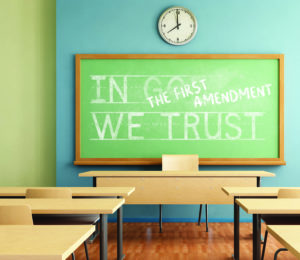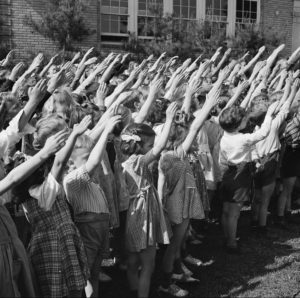Mottos, Prayers, Courses, and Clubs To Protect Students' Rights, We Must Keep Church and State Separate

After the latest round of mass shootings over the course of two weekends—gun violence that claimed a life in the Brownsville neighborhood of Brooklyn; four lives in Gilroy, California; twenty-two in El Paso, Texas; and nine in Dayton, Ohio—we again heard messages of grief mixed with prayers that God would heal the terrible wounds inflicted by disturbed, desperate, or ideologically warped young men.
“We are a loving nation, and our children are entitled to grow up in a just, peaceful, and loving society,” President Trump said in prepared remarks delivered at the White House on August 5, the Monday morning following a weekend of carnage. “May God bless the memory of those who perished in Toledo,” the president intoned, misidentifying the Ohio city where a gunman had murdered nine the previous day. “May God protect all of those from Texas to Ohio. May God bless the victims and their families. May God bless America.”
While this rhetoric isn’t new, including the false claim that more religion would save us from gun violence, it has gotten more aggressive as it pertains to young people. Case in point: the initiation of Project Blitz, which aims to prioritize Christianity in secular institutions under the guise of religious liberty. One of its main targets is the public school system—the recipients being the children Trump says deserve a just world. Christian mottos, prayers, courses, and clubs are all woven into the project’s playbook, and one can only assume attempts to resurrect mandatory recitation of the Pledge of Allegiance is on the horizon.
Motto
Thanks to Project Blitz, students in Louisiana, Arkansas, Tennessee, Florida, Alabama, Arizona, Kentucky, and South Dakota will be inundated with “In God We Trust” signs as they enter schools this coming fall. US courts have ruled that the national motto—adopted in 1956—doesn’t violate the First Amendment’s Establishment Clause because it endorses all religions equally without supporting one over another. This disregards the fact that not all religions are monotheistic and not all people are religious. In South Dakota, the latest state to require that schools prominently display the motto, some students proposed a more inclusive sign that incorporated other terms along with God, such as “Buddha,” “Yahweh,” “Allah,” “Science,” and “Ourselves.” The school board ignored the design.
Conservative lawmakers claim the motto will inspire patriotism, but it is the dangerous conflation of nationalism and religion that will harm students the most. Schools should be a safe place for learning skills and developing critical thinking so young people can become responsible and engaged adults. To support students of all faiths and none, schools must uphold church-state separation.
Prayer
Despite landmark Supreme Court decisions more than fifty years ago that deemed state-sponsored prayer and Bible reading in public schools unconstitutional, the Establishment Clause continues to be tested in regards to prayer.
School-sponsored prayer, religious instruction, and teacher-led prayer in public schools are unconstitutional because they involve a secular institution leading students in a religious practice. Students are free to pray on their own time, and schools are allowed to provide a space for prayers as long as it’s open to all students. Teachers, coaches, and administrators can’t organize, sponsor, promote, or participate in prayers with students on school grounds or at school events. “See You at the Pole” prayer gatherings are only allowed if they are completely student-initiated and attendance is voluntary.
In July 2019, the Appignani Humanist Legal Center won its lawsuit against the Greenville County School District, where public schools were found to have violated the Establishment Clause for holding public school graduations in religious venues and included school-sponsored prayers in such ceremonies. The court’s order declared that schools may not knowingly include a prayer—“whether referred to as a prayer, blessing, invocation, benediction, inspirational reading, or otherwise”—in graduation services and that school staff “shall not encourage, promote, advance, endorse, or participate in causing prayers during any graduation ceremony.” School officials may not provide students with a prayer to read and students speaking at graduation ceremonies cannot ask the audience to join them in prayer.
Pledge of Allegiance

American students once performed the Bellamy salute when reciting the Pledge of Allegiance (named of the author of the pledge, Francis Bellamy). The pledge and salute originated in 1892, but the pledge wasn’t formally adopted by Congress until 1942. That same year Congress officially replaced the Bellamy salute with the hand-over-heart gesture to avoid any association with the strong-arm salute adopted by Italian fascists and Nazi Germans.
In 1943 (West Virginia State Board of Education v. Barnette), the Supreme Court ruled that compulsory participation in the Pledge of Allegiance violates the free speech rights of students and the First Amendment of the US Constitution. In 1954, the Knights of Columbus—a Catholic men’s group—led the lobbying effort to add “under God” to the pledge. No matter their reason, students cannot be forced to participate in—as in stand for or recite—the Pledge of Allegiance and they must not be questioned, harassed, or punished for not participating. Teachers and public schools that violate this right (yes, we know it happens regularly) are subject to lawsuits under the US Code and may be liable for damages and attorney’s fees. The American Humanist Association protects students’ right to not say the pledge and provides resources for students, educators, and families to explain their right to Boycott the Pledge.
Religious Education
Despite the fact that religion may only be taught in public schools if done so objectively and without proselytizing or preaching, Project Blitz’s playbook encourages states to introduce legislation that would allow or require schools to offer electives about the Bible and its influence on American history. Such courses are concerning due to their focus on only the Bible, as opposed to texts from all world religions, and the lack of detail on how instructors would be trained to be objective.
First Amendment defenders must continue to remind the public that while religious texts may be included in a literature or history class, courts have consistently ruled that creationism can’t be taught in public school science classes. It’s unconstitutional to prohibit the teaching of evolution (see Epperson v. Arkansas, 1968) or for a school to put a disclaimer in a science textbook that casts doubt about evolution or tries to teach that creationism is as valid as evolution.
In addition to Project Blitz’s targets and goals for public education, other students affected by religious incursion include those at Orthodox Jewish schools—known as yeshivas. These young people are currently fighting for their right to be taught secular subjects such as English, math, science, and social studies. Private schools are required to provide instruction substantially equivalent to that of the local public school to prepare students for adulthood. Young Advocates For Fair Education is educating people on the issue and requesting that concerned citizens let the New York State Education Department know they support these students’ efforts to ensure children of all faiths and none receive adequate education.
Extracurriculars
After-school clubs are another area where vigilance is needed to protect religious neutrality. If schools allow extra-curricular clubs, then they must allow religious, atheist, and humanist clubs, and they must treat them all equally. Such clubs must be student-initiated and student-led. Whenever teachers, coaches, or staff members are acting in their official capacity, meaning they are an extension of the school and therefore of the government, they must take a neutral position on religion. School staff may not distribute religious material or push students to join religious clubs. For assistance starting or growing a humanist club at your school, connect with the Secular Student Alliance.
As the American Civil Liberties Union of Kentucky said in their February 2019 letter to the Kentucky General Assembly opposing the “In God We Trust” legislation:
We firmly believe that our legislature should be working to ensure that schools are adequately funded, that teachers are appropriately compensated, and that our students receive the highest quality education possible…As always, we remind the legislature that matters of faith are best left to individuals, families, and religious organizations, not state government.
We encourage all who value church-state separation to speak up within your communities for students’ freedom of and from religion in their schools. And if you observe or experience a violation, please report it to the Appignani Humanist Legal Center.
